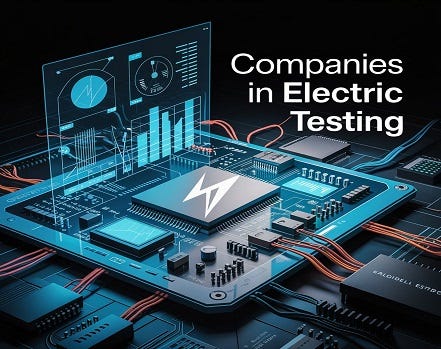views
Introduction
In an age where electricity drives nearly every aspect of modern life — from industrial automation to renewable energy — ensuring the safety, reliability, and efficiency of electrical systems has never been more important. Electric testing companies play a vital role in this process. These specialized organizations provide the expertise, equipment, and certification necessary to keep electrical products and infrastructure functioning safely and effectively.
The Role of Electric Testing Companies
Electric testing companies focus on evaluating the performance, durability, and safety of electrical components and systems. Their services include insulation resistance testing, dielectric strength measurement, ground continuity tests, high-voltage endurance checks, and more.
By conducting these tests, companies verify compliance with global standards such as IEC, ISO, ASTM, and UL. The results not only prevent equipment failures but also ensure regulatory approval for manufacturers entering global markets.
Leading Companies in the Electric Testing Industry
Several key players dominate the global electric testing sector, offering comprehensive testing, inspection, and certification services.
Intertek Group plc
Based in London, Intertek provides electrical safety and performance testing to clients across industries, from consumer electronics to heavy machinery. Their labs are known for advanced high-voltage testing and compliance verification according to international standards.
TÜV SÜD
Headquartered in Germany, TÜV SÜD specializes in certification and testing services that ensure electrical and electronic products meet safety and sustainability requirements. They are a trusted partner for manufacturers in automotive, renewable energy, and industrial sectors.
SGS SA
Swiss-based SGS is one of the world’s largest inspection and testing companies. Their electrical testing division offers energy efficiency evaluations, product certification, and performance benchmarking across multiple markets.
UL Solutions (Underwriters Laboratories)
An American organization, UL has been synonymous with product safety for over a century. UL’s testing facilities assess everything from home appliances to complex grid components, focusing on reducing electrical hazards and improving user safety.
Eurofins E&E
Eurofins Electrical and Electronics (E&E) provides cutting-edge testing and certification solutions for consumer and industrial electrical products, ensuring compliance with both European and international directives.

Emerging Trends and Innovations
As technology evolves, electric testing companies are integrating advanced tools such as AI-driven diagnostics, IoT-enabled testing devices, and digital twin simulations. These innovations enhance precision and reduce testing time while providing real-time monitoring and predictive maintenance insights.
Additionally, the growing emphasis on green energy systems — solar, wind, and electric vehicles — has expanded the scope of electric testing to include battery performance testing, smart grid reliability assessments, and renewable component certifications.
Challenges Facing the Industry
Despite technological progress, the electric testing sector faces challenges such as the rapid evolution of electrical standards, increasing demand for sustainability certifications, and the shortage of skilled engineers familiar with new testing technologies. Companies must continuously invest in training, equipment upgrades, and compliance frameworks to stay competitive.
Conclusion
Electric testing companies are the unsung heroes ensuring that the world’s electrical systems remain safe, efficient, and future-ready. As industries move toward electrification and sustainability, the demand for precise and reliable testing services will only grow. The companies leading this field today are not just testing for compliance — they are powering progress, safety, and innovation across the globe.










